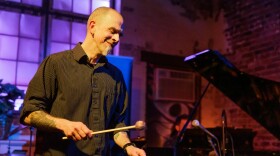According to the “Czar of Noir,” Eddie Muller, film noir portrays “the flip side of the all-American success story.”
“It’s about people who realize that following the program will never get them what they crave,” Muller writes. “So they cross the line, commit a crime and reap the consequences. Or, they’re tales about seemingly innocent people tortured by paranoia and ass-kicked by Fate. Either way, they depict a world that’s merciless and unforgiving.”
That’s pretty grim.
Critic Roger Ebert had a 10-point list of film noir identifiers, which included:
Locations that reek of the night, of shadows, of alleys, of the back doors of fancy places, of apartment buildings with a high turnover rate, of taxi drivers and bartenders who have seen it all.
That’s the connection to jazz in film noir.
Set in the urban night world of the 1940s and 1950s, many noir films will have at least one scene in a bar or nightclub, where a jazz or blues band contributes to the general atmosphere of hedonism, wantonness and the antics of characters with “low morals.” It’s a stigma that jazz and blues music carried around for decades, before they were recognized as art forms, and actually taught in schools.
Luckily, not all noir films relegate jazz to the back alley.
Otto Preminger’s 1959 classic “Anatomy of a Murder” starred one of the least-noir actors of the time, Jimmy Stewart, as a jazz-loving, piano-playing lawyer. The Duke Ellington/Billy Strayhorn score for the film won three Grammy Awards in 1959. Ellington and a few of his band members also appeared on screen.
Also released in 1959, "Odds Against Tomorrow" starred Robert Ryan and Harry Belafonte, and featured an original score from pianist/composer John Lewis, leader of the very proper "classical plus jazz" group, the Modern Jazz Quartet.
Part of the fun of watching film noir is looking for and identifying the musicians of the era who might turn up.
Quite a bit of noir film music has become standard jazz repertoire. Flugelhorn master Dmitri Matheny shared his "Noir Medley" with KNKX in 2017.
SIFF (Seattle International Film Festival) presents its annual Noir City Seattle program at SIFF Cinema Egyptian Feb. 11-17. Eddie Muller will be in attendance on the 11th through the 13th.
We don't see any major jazz artists of the past in this year’s Noir City line-up, but when you go, do look for the brief demonstration of boogie-woogie piano in the 1950 film “Try and Get Me.”







